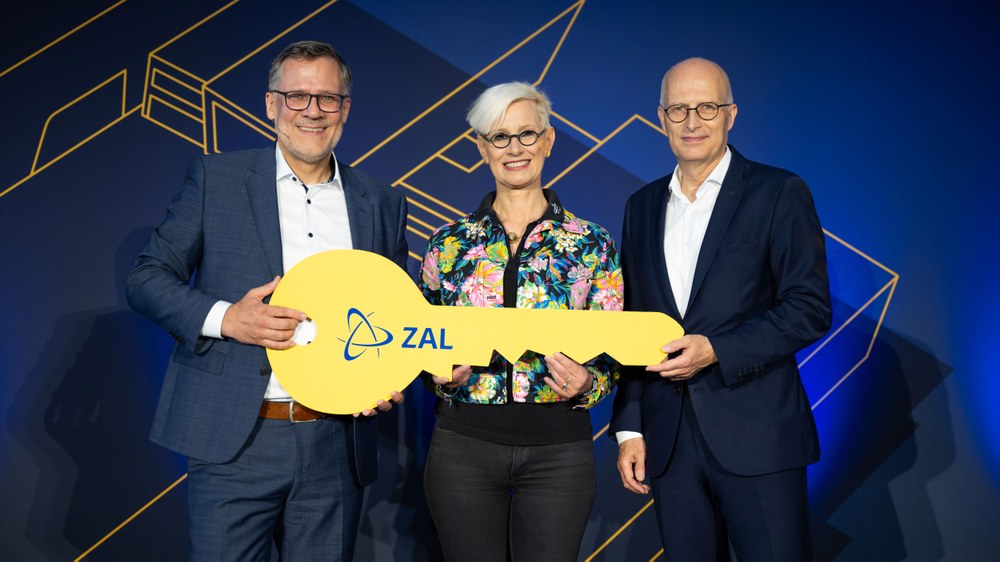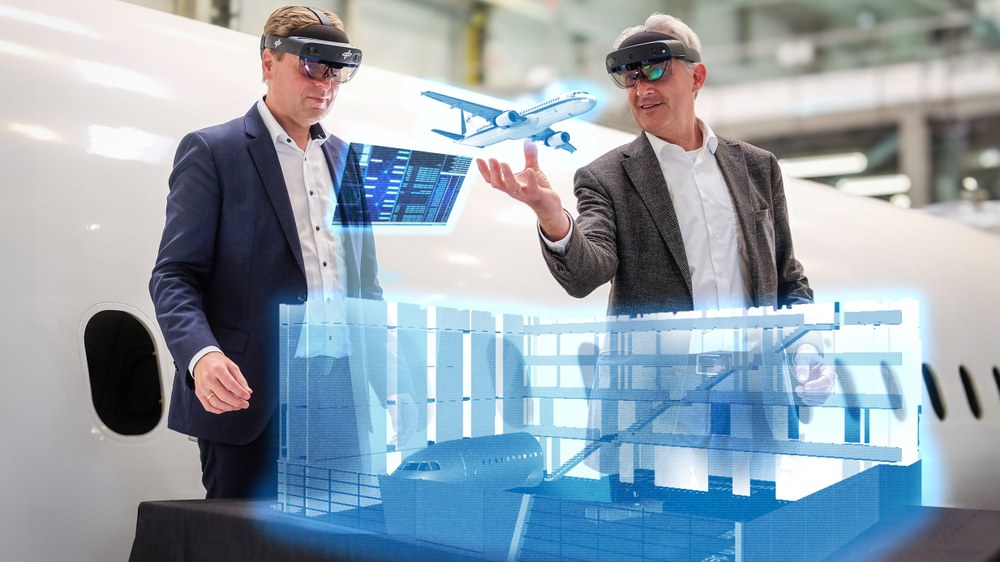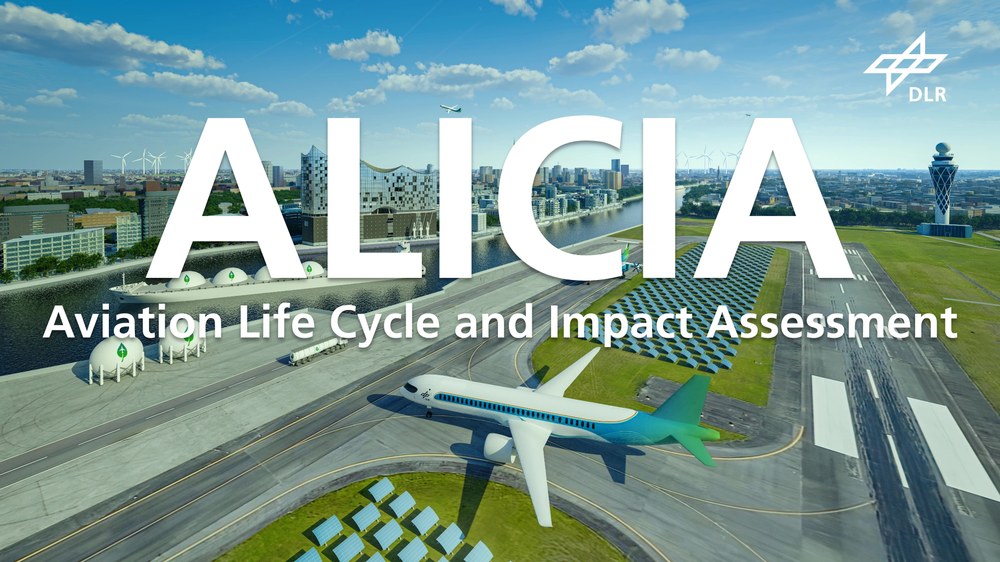DLR moves into new space at ZAL TechCenter


- On 10 July 2024, Hamburg's First Mayor, Dr Peter Tschentscher, handed over additional research space to DLR at the ZAL TechCenter.
- New space is being created at the site for research into maintenance and digitalisation for climate-compatible aviation.
- Focus: Aviation, digitalisation, climate-compatible flying
The German Aerospace Center (Deutsches Zentrum für Luft- und Raumfahrt; DLR) will now benefit from more space for innovation at its Hamburg-Finkenwerder site. In a ceremony held on 10 July 2024 and less than two years after the foundation stone was laid, the First Mayor of the Free and Hanseatic City of Hamburg, Peter Tschentscher, led the inauguration of the new extension to the ZAL Center of Applied Aeronautical Research (the ZAL TechCenter), handing over the new research space to the main tenant, DLR.
Two DLR institutes will occupy roughly two-thirds of the newly available space, the institutes of 'Maintenance, Repair and Overhaul' (MRO) and 'System Architectures in Aeronautics'. DLR has been researching climate-compatible aviation since the founding of the two institutes at the Hamburg-Finkenwerder site in 2017 and has now signed up for a lease of a further 25 years. The remaining 8000 square metres of this large annex are reserved for SMEs and flexible tenants who plan to use the ZAL facilities for shorter periods and project-based research.
"As one of the largest centres for aerospace research and development in Europe, we are delighted to move into this new space in Hamburg," commented Anke Kaysser-Pyzalla, Chair of the DLR Executive Board. "In these new laboratories, we will conduct intensive research into climate-compatible aviation and all of the interconnected fields within it, with a strong focus on digital processes, new aircraft configurations and new maintenance concepts. Direct networking with the Hamburg aviation and air traffic industries, as well as start-ups in the ZAL TechCenter, offers the ideal conditions for exchanging knowledge with public authorities and transferring technology to industry. We are grateful for the continued support received from the city of Hamburg, especially from the economic authorities and the Hamburg Aviation industry cluster."
"Hamburg is the third largest hub for the civil aviation industry worldwide and a leading centre for research and development," says Hamburg's First Mayor Peter Tschentscher. "Global market leaders, start-ups, research institutes and universities are working together on the aviation of the future at the Center of Applied Aeronautical Research. The expansion of the ZAL TechCenter creates additional capacity for innovations 'made in Hamburg' and strengthens the DLR institutes based here. I would like to thank everyone involved and congratulate them on the opening of the extension."
New laboratories and office space for more expertise
Thanks to a desk-sharing design, up to 300 DLR employees will soon be working under the same roof in the ZAL extension. Here, the DLR Institutes of Maintenance, Repair and Overhaul and of System Architectures in Aeronautics will research sustainable aircraft and operational concepts, carrying out modelling and evaluations of the entire aerospace system over the full life cycle, from energy production to climate impacts. This involves not only new aircraft, but also their manufacture, operation, maintenance and even end-of-life decommissioning. The expansion makes even more workspace available to DLR's burgeoning institutes and their laboratories.
Two new laboratories are planned. In the future, a business jet will form the basis of the 'MRO-Reallabor' (real-world lab), providing a platform to test new maintenance technologies and processes. The fuselage for example forms the basis for validating the integration of new cabin systems, fuel cells or refuelling systems into new climate-compatible aircraft concepts.
Holistic solutions for climate-compatible aviation
The DLR Institute of System Architectures in Aeronautics is researching how new technologies and future aircraft can be both climate-compatible and cost effective. To achieve this, the institute is developing digital processes to integrate operations and manufacturing in future factories right from the planning stage. These procedures also provide the basis for the ALICIA (Aviation Life Cycle and Impact Assessment) digital platform for pooling the expertise of multiple DLR institutes. ALICIA fosters a holistic assessment of the impact of new technologies, enabling DLR to support industry and policymakers in coming to fact-based decisions on future sustainable air transport systems. ALICIA’s digital methodologies allow it to assess technologies from the commercial sector, evaluate their market potential and provide predictions on trends in aviation.

Demo: The ALICIA digital assessment platform for the entire aviation system
Your consent to the storage of data ('cookies') is required for the playback of this video on Quickchannel.com. You can view and change your current data storage settings at any time under privacy.
Maintenance of hydrogen-based propulsion systems
The DLR Institute of Maintenance, Repair and Overhaul is researching concepts and technologies for the operation and maintenance of hydrogen systems in aircraft engines. In the future, procedures that are difficult or dangerous for humans will be conducted automatically by endoscopic inspection robots, and the new MRO-Reallabor facility allows such maintenance approaches to be tested in a realistic environment for the first time. The new infrastructure simulates maintenance operations on laboratory scales to research the interactions between digitally supported technicians and how well new technologies and instruments for process optimisation perform when practically used. These new test benches also help in the development of early damage detection and prediction.

Video: H2Leak for the visualisation of gas leaks using a smart sensor network
Your consent to the storage of data ('cookies') is required for the playback of this video on Quickchannel.com. You can view and change your current data storage settings at any time under privacy.
ZAL Center of Applied Aeronautical Research
"This new extension offers ZAL's partners more room and more opportunities in equal measure!" said Roland Gerhards, CEO of ZAL GmbH. "Part of the new space is reserved for SMEs, start-ups and changing partners working on project-based research. The advantages for these enterprises are clear: integration with ZAL coupled with flexibility in terms of technical equipment, team size and project timelines. If needed, this can be enhanced with support in areas such as prototype construction and agile innovation."
DLR's Hamburg-Finkenwerder site will shape the future of civil aviation. Over 30 partners from industry and science are working under one roof in the 34,000-square-metre ZAL Center of Applied Aeronautical Research – from Airbus, Lufthansa Technik, Diehl Aviation, Dassault Systèmes and DLR, to the Fraunhofer Institute and Hamburg's universities. Approximately 850 researchers are working on topics such as robotics and automation, digitalisation, cabin acoustics and smart cabin design. Additionally, the in-house Fuel Cell Lab offers researchers the optimal conditions to further enhance sustainability within aviation.
